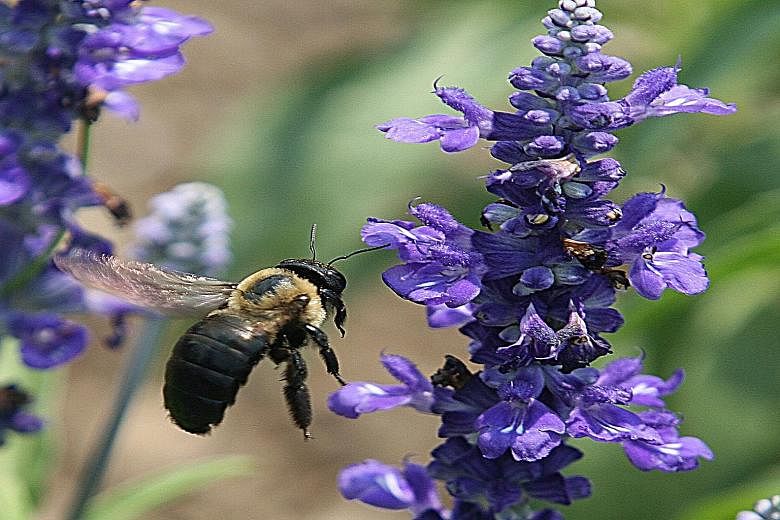MIAMI • Bumblebees are struggling to adapt to global warming and they are simply dying rather than migrating northwards to cooler climes, said a study that raised new concerns about these important pollinators.
The report in the journal Science on Thursday is the first of its kind to point to the role of climate change in worldwide bee decline, which until now has largely been blamed on pesticide use, parasites, disease and loss of areas for habitat.
"Picture a vice. Now picture the bumblebee habitat in the middle of the vice," said lead author Jeremy Kerr, a professor of macroecology and conservation at the University of Ottawa.
"As the climate warms, bumblebee species are being crushed as the 'climate vice' compresses their geographical ranges," he added. "The result is widespread, rapid declines of pollinators across continents, effects that are not due to pesticide use or habitat loss."
Bumblebees help pollinate plants, wildflowers and fruit trees as well as important crops like blueberries and tomatoes, providing an invaluable service to agriculture and wildlife.
"Wild bumblebees are important pollinators of agricultural crops such as blueberry, apple, pumpkin and tomato, and declines in this ecosystem service of pollination could lead to lower crop yields and higher food costs, with consequences for both our food supply and the economy," University of Vermont biologist Leif Richardson said.
The decline in pollination could make food more expensive and some crops harder to grow, researchers said.
By examining nearly a half million records from museums and citizen scientists on 67 bumblebee species in North America and Europe beginning in 1900, researchers were able to track changes in the bumblebees' range over time. They found that bumblebees have lost as many as 300km of their historical southern range in North America and Europe.
"This is a huge loss, and it has happened very quickly," said Professor Kerr.
"We are looking at rates of loss of about 9km per year from those southern areas," he told reporters.
Meanwhile, bumblebees are "generally failing" to move north and are instead going locally extinct in some areas.
"They just aren't colonising new areas and establishing new populations fast enough to track rapid human-caused climate change," Prof Kerr said.
The failure of bumblebees to adapt is in contrast to the behaviour of butterflies, which have been shown to change their migration patterns in response to warming temperatures.
Ways to help the bees survive should include reducing global greenhouse gas emissions, as well as helping them establish populations in northern latitudes, a process known as assisted migration, researchers said.
AGENCE FRANCE-PRESSE, REUTERS

